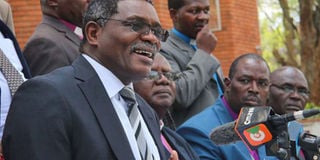‘Nusu mkate’ idea misses the point on struggle for freedom

The National Council of Churches of Kenya secretary general Peter Karanja, accompanied by other council members, speaks to journalists on October 31, 2017 concerning the political crisis in the country. NCCK proposed that the country creates a Prime Minister position, and other positions in the Executive for the opposition. PHOTO | KANYIRI WAHITO | NATION MEDIA GROUP
What you need to know:
- We will need to recognise and come to terms with issues of electoral justice and impunity.
- Once a sizable proportion of the population loses hope in elections, we will be flirting with serious existential dangers that we do not need.
As its suggested solution to the current acute national crisis, the National Council of Churches of Kenya (NCCK) has proposed that the country creates a Prime Minister position, and other positions in the Executive for the opposition.
They think that this will deal with the question of political, social and economic exclusion that is one of the major drivers for discontent, tensions and frustrations for about two-thirds of the country that registered less that 50 per cent turnout in the recent rerun presidential election.
HEGEMONY
This suggestion is misguided, and perhaps deliberately so.
First, it is amazingly patronising and insulting, implying that the way to deal with deep divisions is to simply bribe some people with positions.
This is the way people with hegemonic power or domination over others think; much as the way some parents think that the best way to appease an errant child is to give them some goodies.
Second, the suggestion misunderstands the nature of dissent in Kenya.
RAILA
While Raila Odinga presently symbolises the dissent and discontent in about two-thirds of the country, the discontent and frustrations will not be resolved were he to accept a position in the Executive as presently constituted, and changed minimally to accommodate him and a few other opposition leaders.
The discontent is not about him as a person or candidate.
I dare say that were Mr Odinga to accept a position in a “nusu mkate” sort of arrangement, as NCCK is proposing, he may well lose the vast constituency of people supporting the cause for fundamental and progressive changes in the country, which he has come to symbolise over the years.
MARGINALISED
Mark you, doing so would ultimately marginalise him and reduce his significance, which is perhaps what NCCK and Jubilee want, but it would also have a serious impact on the state of dissent in the country.
Most significantly, were Mr Odinga to fade as the symbol of discontent and dissent, it is very likely that there would be a furious competition to take his space, and the more extreme the competitors, the more likely they would be to fill this vacuum.
Whatever one may think of Mr Odinga, he has had a moderating effect on the millions of disaffected Kenyans who have felt, and been treated, as second class citizens, politically, socially and economically, ever since the implementation of Sessional Paper no 10 of 1965 that decided to focus development first on the areas that were “more productive”.
DISCONTENT
The other “less productive” regions were supposed to benefit from trickle-down economics.
But as proven across the world, “trickle-down” economics is a hoax even in the most laissez-faire capitalist countries in the world such as the USA.
If we want to resolve the serious divisions in Kenyan society, and stem what will inevitably be growing calls for secession in many regions of the country, we must start at the beginning and acknowledge that the discontent has a lot to do with past choices made politically, socially and economically — including the disastrous Sessional Paper no 10.
INFRASTRUCTURE
And let’s not poo-pooh the perceptions of marginalisation that most of the country feels.
We all know the frantic and successful efforts, supported by the regime, to ensure coffee, tea, pyrethrum and milk production increase.
And then we all see that sugar, cotton, livestock, and fish production getting cursory attention that does not achieve the desired effects and which increase during campaign periods.
We know how accessible most of Central (with the Thika Superhighway as the gem) and Rift Valley regions are by road, to the extent that the dual carriageway is being extended to Nanyuki, yet we all know that the gateway is the Mombasa to Busia/Bungoma highway, which is only now being dualised in some small parts.
PEACE
Moreover, we will need to recognise and come to terms with issues of electoral justice and impunity.
If elections are always handled in a way that favours incumbents and are manipulated to make sure that status quo prevails, then we might as well kiss goodbye this peaceful means of possible change.
Once a sizable proportion of the population loses hope in elections, we will be flirting with serious existential dangers that we do not need.
Maina Kiai is a human rights activist and co-director at InformAction. [email protected]





